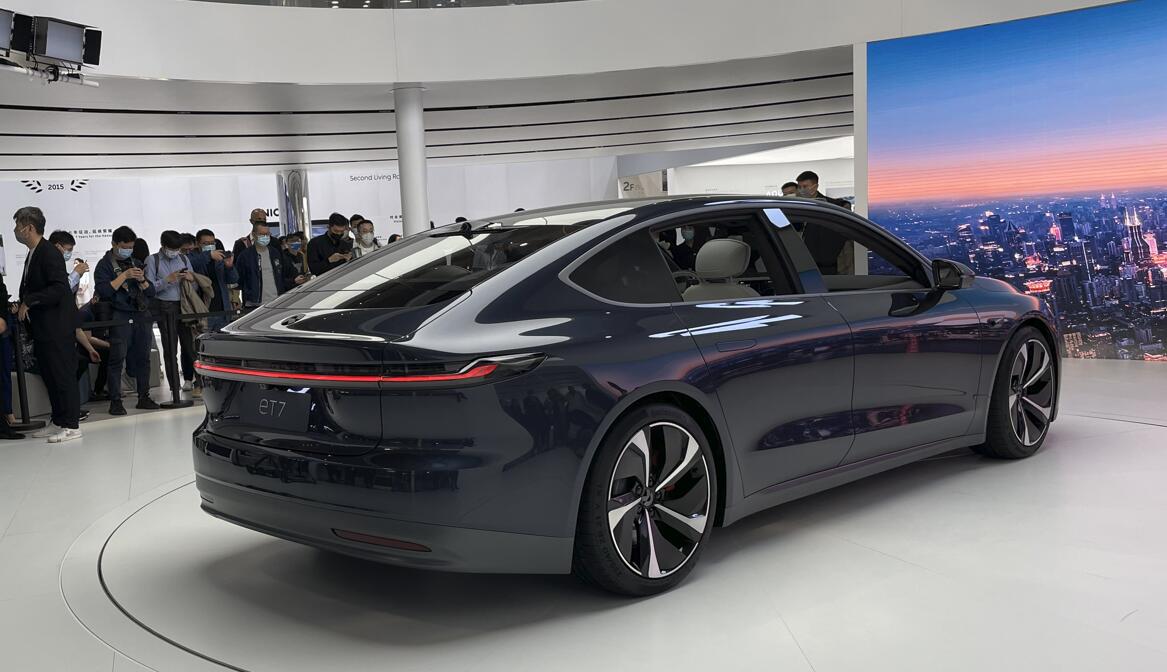NIO will no longer give customers a free home charger, and will upgrade NOP+ to a formal release and start a subscription system for the software starting July 1 for RMB 380 per month.

(Image credit: CnEVPost)
NIO (NYSE: NIO) announced two important decisions today that are expected to spur order growth in the short term, as well as allow the software to start contributing to revenue.
The Chinese electric vehicle (EV) maker is scaling back the benefits it offers customers, as its user base has recently surpassed 300,000.
Starting June 1, customers who purchase the NIO ET7, EC7, ES7 and ET5 will no longer continue to receive free home chargers, and the free battery swap benefit will be adjusted to four times per month, the company announced today.
As background, NIO has offered customers free home chargers and four free battery swaps per month for the past several years.
If customers choose to forgo the free home charger, they will receive six free battery swaps per month.
For customers who pay a deposit for the above models on or before May 31, the benefits for first-time owners will remain the same.
Test drives and lock-in orders for the new ES8 will be allowed starting in June, and customers who pay a deposit for the model before August 1 will still enjoy these benefits before they are scaled back.
For all customers who have already received deliveries of the vehicles, their rights are not affected, NIO stressed.
The move is expected to boost potential customers' car purchase decisions in the short term, as the 7 kW home charger NIO has been giving away in past years costs RMB 7,500 ($1,090) each.
The free battery swap entitlement that NIO offers owners 4-6 times per month is valid for life.
The move comes at a time when NIO's user base is getting larger. The EV maker delivered 10,378 vehicles in March, bringing its cumulative deliveries since inception to 320,597, according to data released earlier this month.
In addition to the reduced vehicle purchase rights, the NOP (Navigate on Pilot) + assisted driving software, which NIO offers owners a free trial of, will require a fee starting in July.
The free trial of NOP+ Beta will end on June 30, and from July 1 the software will be upgraded to a formal release and on a subscription basis for RMB 380 per month, the company announced today.
NOP+ is NIO's assisted driving feature based on its NT 2.0 platform, which enables a point-to-point assisted driving experience on highways and urban expressway scenarios.
NOP+ Beta features include automatic ramp entry and exit, automatic selection of the optimal lane, and active passing of slow-moving vehicles.
On December 27, 2022, NIO began recruiting the first beta testers for NOP+ Beta, which was limited to 10,000 slots.
On February 20, NIO began allowing owners of all its NT 2.0 platform vehicles to apply for a trial of NOP+.
As of April 8, nearly 45,000 owners have participated in the free trial of NOP+ Beta, and the mileage has exceeded 21 million kilometers, NIO said today.
NIO has collected more than 38,000 user feedbacks in the trial, allowing more than 20 iterations of the software, it said.
Currently, NOP+ Beta has covered 95 percent of China's core highways and urban expressways, and has significantly improved the safety and comfort of the experience in scenarios including following, changing lanes to overtake and ramp passing, NIO said.
NOP+ will gradually switch and upgrade to BEV architecture in 2023, and the leading hardware capability and algorithm architecture will help NOP+ cover more road scenarios, the company said.
In addition, starting in the second half of 2023, the pilot assisted driving feature in the middle of battery swap stations on highways will gradually cover all such stations, NIO said.
Notably, NIO has set aside time for potential customers to consider it.
Customers who purchase ET7, ES7, EC7 and ET5 before June 1, and those who purchase the new ES8 before August 1, will receive 2 years of free access to NOP+.
Customers who have previously purchased the NIO Pilot software will receive at least 5 years of free NOP+ if they purchase a new Banyan-based model from NIO again.
($1 = RMB 6.8750)
The post NIO scales back purchase benefits, NOP+ software to start charging in Jul appeared first on CnEVPost.
For more articles, please visit CnEVPost.













